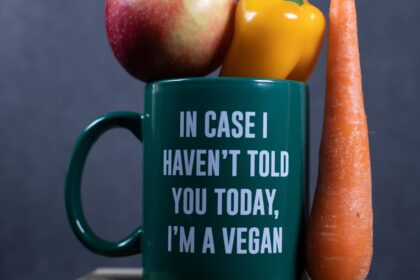Spoiler alert: The answer is HECK NO! Conversations with a Friendly Vegan (CWAFV) offers a framework to communicate in a way that supports connection, even in the face of strong disagreement. It can be applied in personal relationships with friends and family, where the topic of veganism can be, shall we say, strained.
CWAFV is also an approach to vegan activism. It differs from other approaches in a few significant ways but here’s where it’s similar: CWAFV is about identifying objective truth about the way we use animals and clearly communicating that truth. Where it differs is in its focus on the relationship, in connecting and bonding with someone who holds non-vegan views. It’s this focus, I believe, that can lead to the misconception that it’s too apologetic or that it requires us to bend over backward to appease the non-vegan in order to keep the peace. While I’m the first to admit that I place a high value on peace as a more general concept, in conversations, truth can disrupt peace and I think that’s just fine.
Vegans are disruptors, even before we utter a word. Just by being vegan, we challenge the status quo, a state that can feel super uncomfortable for those in our orbit. Discomfort is not really the problem, though. Most of us can deal with that, especially once we get used to it. At this point, I welcome that feeling because it’s a signal to me that we’re getting into some meaningful territory.
So, is CWAFV too soft? No. In fact, I believe it’s one of the most powerful ways we can advocate for veganism. Here’s why: My goal is to be both compassionate and persuasive. As such, the conversation must begin with connection. I have to actually care about the other person and what they believe. I don’t have to AGREE with them, mind you. I don’t have to pretend to agree with them. But, I do have to give a crap if I want to authentically communicate what I believe while building strong relationships. CWAFV is my way of sharing what I believe in a way that is in keeping with my integrity because compassion is front and center. Compassion is what drove me to become vegan.
What will happen if my only priority is to deliver my vegan message without taking the time to connect and understand the other person? I believe it’s possible that some people can be moved to think and act without the connecting part, in particular when they interact with activists at a demonstration. I’ve certainly had such interactions and those have shaped my thinking. But, in my personal life, I have found that no one wants to listen to me if they don’t trust me and trust comes only from connection. No one wants to hear what I have to say if I’m not willing to listen to them.
Now, allow me to complicate this just a little more. Does this mean I have to suffer through someone ranting at me while I politely listen in a failing attempt to connect? Nope. Through CWAFV, we learn to recognize lost cause conversations. We can continue to listen if we like, but we’re no longer actively attempting to connect. When I recognize this type of conversation, I generally end it as soon as possible usually by changing the subject or walking away. But I will rarely if ever walk away from someone who is genuinely willing to engage in a connected conversation where we are both in it to listen, understand, learn and maybe even change. Sometimes, you have to make your intentions overt. If you choose to use the CWAFV tools, you may have to be the one to lay down your arms, wave the white flag and invite someone into a compassion-focused discussion. I see CWAFV as a set of tools at my disposal to use when and how I wish.
What about other forms of advocacy? I’m all for any and all forms of non-violent activism. I’ve picketed, I’ve volunteered in mail campaigns, I’ve even yelled through a bullhorn once or twice. CWAFV doesn’t replace any of it but, rather, is a way to be what I call an Everyday Activist, someone who is prepared to engage people in a conversation that furthers the cause and embraces the kind and compassionate world that prompted us to go vegan in the first place. It is a seamless way to be vegan in the world – I’m not putting on my activist hat – I’m being me in the world.





